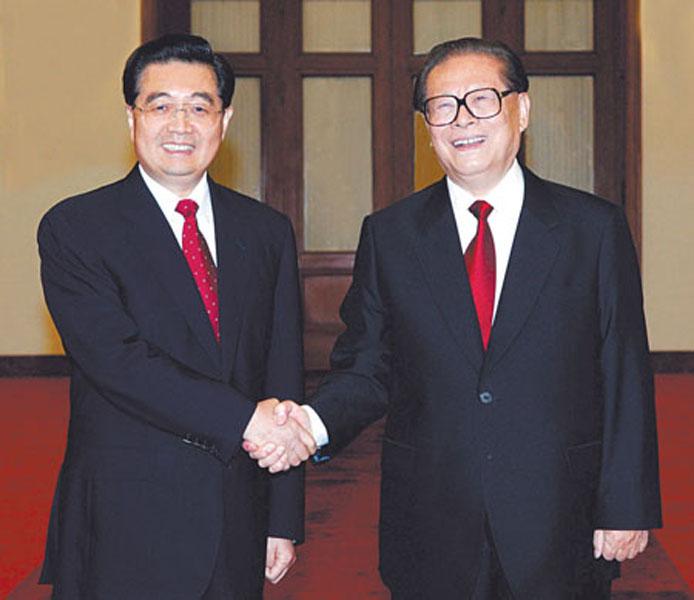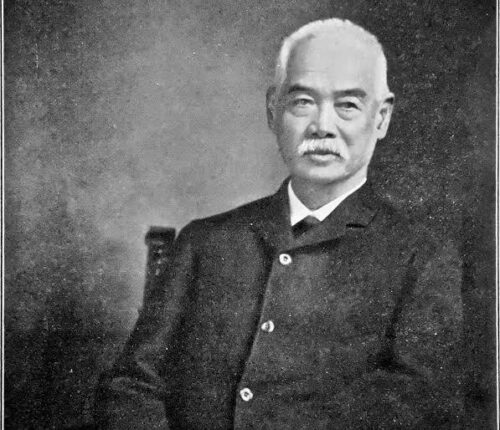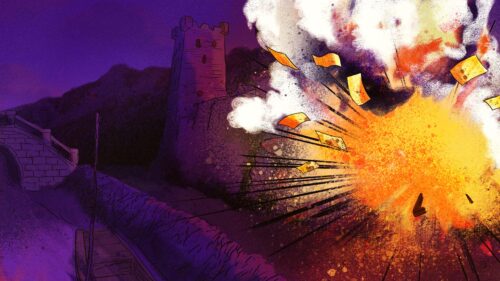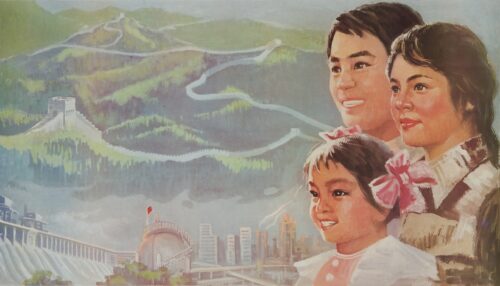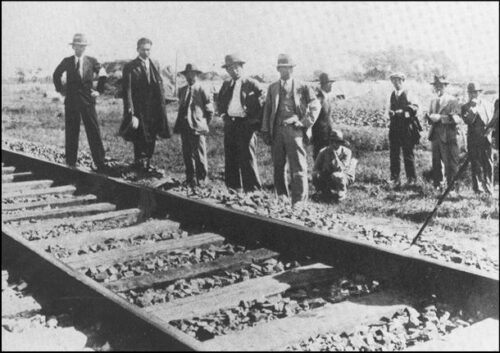This Week in China’s History: September 19, 2004
China has seen many momentous political transitions. Many — revolutions, coups, assassinations, elections — have been the subject of this column, the more spectacular the better. But this week we look back to a moment without violence or ceremony that was nonetheless crucial to China’s political leadership: September 19, 2004, when Jiāng Zémín 江泽民 resigned as chairman of China’s Central Military Commission, his last significant leadership post. Twenty months earlier, Hú Jǐntāo 胡锦涛 had succeeded Jiang, first as Party General Secretary, and then, a few months later, president. When Jiang left the Joint Military Commission, it concluded the first orderly transfer of power in the leadership of the People’s Republic of China.
Political succession vexes many countries. The United States prided itself on the “peaceful transition of power” and has reckoned uncomfortably with the violence that challenged Joe Biden’s succession of Donald Trump. In China, the Communist Party has pointed to its ability to provide stability for a country in the throes of rapid change. Particularly since the protests and their suppression in 1989, the Party has emphasized that its ability to provide material development, exemplified by GDP growth and mushrooming infrastructure, justified — even required — its singular control over politics. To establish that claim, smoothing over and rationalizing the succession process was essential.
Succession at the top of the Communist hierarchy was through some combination of fiat, treachery, and violence. Máo Zédōng 毛泽东 had personally chosen Liú Shǎoqí 刘少奇 to succeed him, but Liu had been denounced and purged in the Cultural Revolution, eventually left to die humiliated and alone. Lín Biāo 林彪, the next heir apparent, died after attempting an apparent coup against Mao. Mao would not relinquish power until he died, and then his third successor, Huá Guófēng 华国锋, was forced out of power by Dèng Xiǎopíng 邓小平. Deng’s first two chosen successors were purged amid the protests of the 1980s.
The man who finally succeeded Deng was Jiang Zemin, and his ascension was anything but by the book. With Deng approaching 90 years old, protesters occupying Tiananmen Square, and the stability of the government in peril, Party Secretary Zhào Zǐyáng 赵紫阳 was forced out. Jiang Zemin was chosen largely to be a placeholder, acceptable to all sides but embraced by none. The new leader, as Richard McGregor describes it in his terrific history of the CCP, The Party, “had to be smuggled into the capital to take up his position…picked up at the airport in a VW Santana [and] told to change into worker’s clothes for the ride into town, lest any of the angry demonstrators still filling the streets should spot him.” Not the dignified succession the Party sought.
Jiang proved more formidable than anyone anticipated. Easily caricatured for his slicked back, dyed hair and enormous eyeglasses, the former Shanghai mayor quickly consolidated power, ably led China out of the crisis of 1989, and cemented his position at the 1992 14th Party Congress. Deflecting criticisms about human rights, navigating challenges from other senior leaders, and above all overseeing a robustly growing economy, Jiang accrued the kind of personal power that typified his predecessors, but which few expected him to achieve. At the time of his appointment, many observers noted that Jiang was the first leader who was not of the Long March generation: without the imprimatur of that shared revolutionary experience, how would Jiang ensure his legitimacy?
China news, weekly.
Sign up for The China Project’s weekly newsletter, our free roundup of the most important China stories.
At the core of Jiang’s success was a grim bargain: exchanging political expression for stability and economic growth. Jiang’s government delivered a growing economy, but for long-term political stability, a peaceful transition of power was needed. Once dismissed as a manipulable lightweight, Jiang acquired all of the titles that, collectively, made him China’s leader: President of the People’s Republic, Chairman of the Central Military Commission, and, most importantly, General Secretary of the Communist Party. Would he willingly give them up? Deng Xiaoping, wary of the kind of cult of personality that had sustained Mao Zedong, had implemented limits of two five-year terms for Party Secretary: the test would come in 2002, when the second of Jiang’s two terms would end.
As the congress approached, intrigue intensified. Jiang Zemin, far from laying a foundation for the transfer of power, made bold and sweeping pronouncements about Party ideology. The “Three Represents” — Jiang’s theoretical renovation of the relationship between the Party and the people — assumed a more central role. Rumors circulated that Jiang was considering staying on as General Secretary, some said at the urging of Hu Jintao. The Party’s summer meeting to prepare for the National Congress lasted longer than usual, extending past the August 1 holiday and fueling speculation about dissent within the Party leadership. And even after the meeting adjourned and the date for the Congress was set, rumors about the size and composition of the Politburo persisted.
To the surprise of some, there was little drama at the 16th Party Congress in 2002. As planned, Hu Jintao was named Party Secretary. That is not to say that Jiang disappeared. The Three Represents were made part of the CCP canon, ratified as a guiding principle. And the enlarged Politburo was filled with Jiang’s supporters.
Most concretely, Jiang Zemin retained his position as the Chairman of the Central Military Commission. Political Scientist Joseph Fewsmith went so far as to describe the meeting as “The Succession that Didn’t Happen” in the prestigious journal The China Quarterly. Looking at the importance of the Three Represents at the meeting, the prominence of Jiang’s supporters in the new leadership, and Jiang’s continuation as military commision chair, Fewsmith argued that, “expected to be the star of the show, Hu Jintao was left to applauding Jiang’s accomplishments.”
In the wake of the meeting, Fewsmith wondered about the very same issues that China’s leadership was struggling with. “The outcome of the congress,” he wrote, “made clear that meaningful political succession remains at least five years away. In forcefully asserting his power, Jiang opens up questions about the degree to which political governance, particularly at the top of the system, has been institutionalized.”
The key question was the military chairmanship. For decades, the military’s loyalty to the political leadership was assumed to be guaranteed because of the Long March experience. Jiang lacked that automatic legitimacy, but had clearly gained the endorsement of the armed forces during his decade in charge. Rumors persisted that Jiang would retain his chairmanship for at least five years, and perhaps indefinitely.
So it was both an anticlimax and a surprise when, in September 2004, less than two years after the Party Congress that installed Hu as general secretary, Jiang Zemin resigned his position. Jiang certainly remained an important force behind the scenes, but the move was widely seen as completing the orderly transition of power. In his book, McGregor quotes Chinese newspaper editor Zhou Ruijin: “Hu’s transition finally took the Chinese government out of the imperial age and ensured it was no longer a one-man show.”
For a while, perhaps.
The next transition would take place in 2012, but Xi Jinping’s ascension to the height of the CCP hierarchy was political hardball, not orderly succession: charismatic rival Bō Xīlái 薄熙来 remains in prison. Once in power, Xi dismantled many of the checks on authoritarianism that had been developed. A sweeping “anti-corruption” campaign was an effective tool to root out bribery but also a cudgel to silence challengers. Term limits were done away with. There is no sign of Xi leaving office anytime soon.
But for a moment, in 2004, it appeared that China might have achieved that ideal “peaceful transition of power” that so many nations these days aspire to.
This Week in China’s History is a weekly column.
